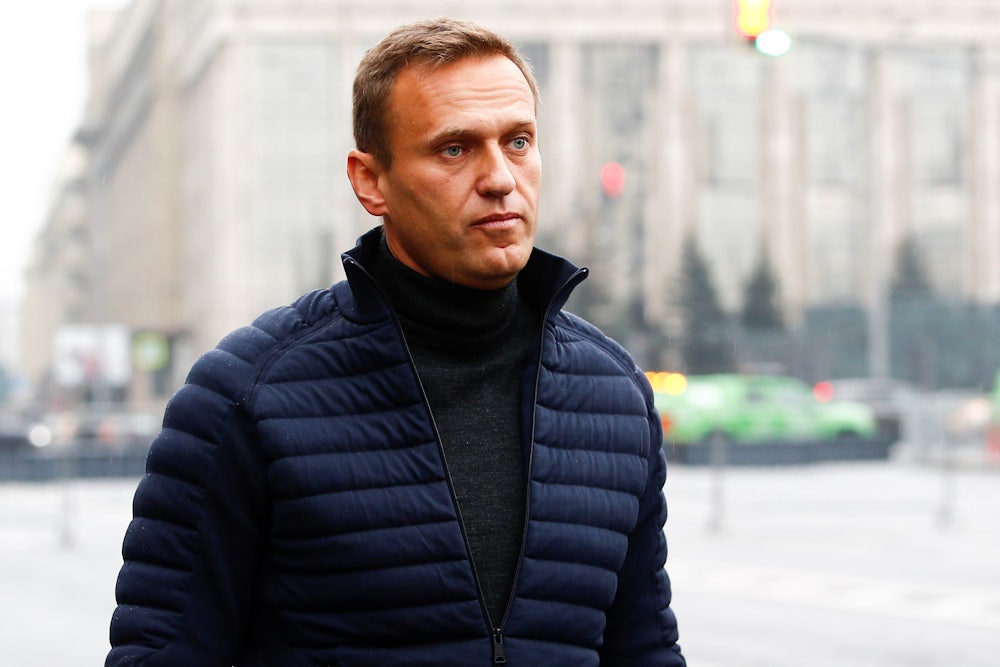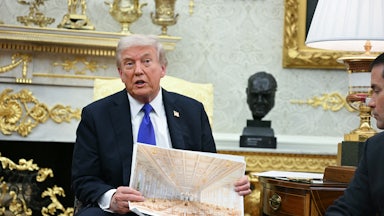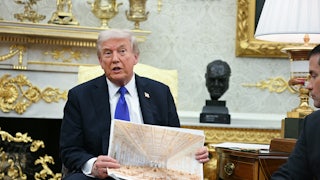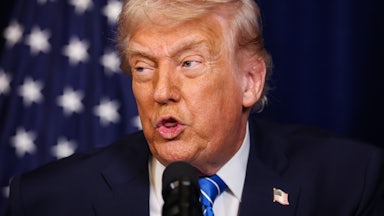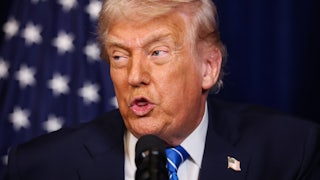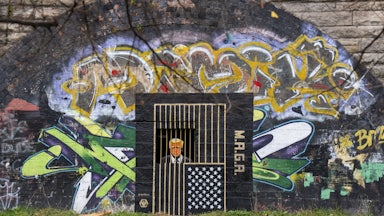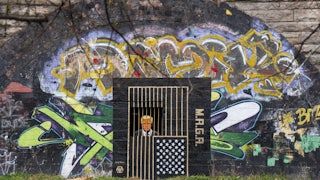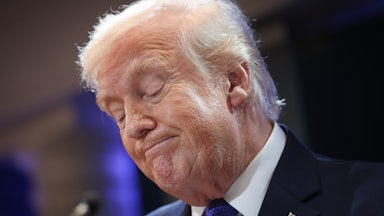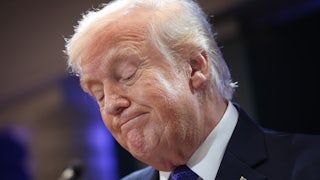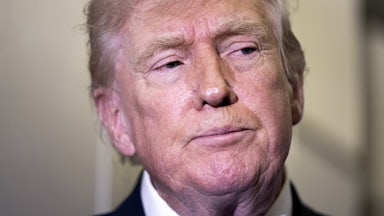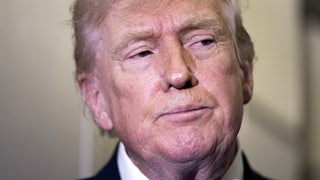Last week, in an encouraging development where Russia’s internal politics are concerned, Russian opposition leader Alexei Navalny unveiled a series of “theses” outlining what a post-Putin Russia should look like. In so doing, Navalny finally clarified his position on the one issue that has, for some time now, driven a wedge between him and Western allies, especially those in Ukraine: Russian imperialism—and, more specifically, the fate of Crimea.
Over a series of Twitter posts, Navalny announced that Crimea should be returned to Ukraine, full stop. Navalny wrote that Ukraine’s borders are “similar to Russia’s—[they were] internationally recognized and defined in 1991.” All of the areas of Ukraine that the Kremlin has supposedly “annexed” are, by right and by law, still Ukrainian, including Crimea.
The announcement is the conclusion of a years-long song and dance Navalny and his supporters have performed in relation to the peninsula’s future. For nearly a decade, Navalny’s stance on Crimea has been “ambiguous,” as The Moscow Times recently reported. And while Westerners feted Navalny for his ongoing bravery, Ukrainians were rightly infuriated by his relative coyness about the fate of the peninsula. (When an interviewer asked whether Navalny would, if elected president, return Crimea to Ukraine, Navalny infamously responded, “What, is Crimea a ham sandwich or something that you can take and give back? No, I don’t believe so.”)
Now Navalny has seemingly put the issue to bed. And in so doing, he has finally begun to address the core issue propelling the Russian devastation of Ukraine and the militarized dystopia Putin’s Russia has become: rote imperialism, predicated on conspiratorial resentment, unabashed revanchism, and neocolonial aspirations. After years of trying to shunt the topic of Russian imperialism to the side, Russian liberals appear finally to be waking to the reality that Russian colonialism and Russian chauvinism stand at the core of the country’s collapse into totalitarianism.
Indeed, Navalny further addressed the topic of Russian imperialism within his new series of “theses.” “Does Russia need new territories?” the jailed opposition figure asked. “Russia is a vast country with a shrinking population and dying-out rural areas. Imperialism and the urge to seize territory is the most harmful and destructive path.” This irredentism, as Russian liberals have begun to see, has resulted in unmitigated catastrophe. “Once again, the Russian government is destroying our future with its own hands just in order to make our country look bigger on the map,” Navalny continued. “But Russia is big enough as it is. Our objective should be preserving our people and developing what we have in abundance.”
Naturally, Navalny’s new stance against Russian imperialism is several years late and has only arrived now as a direct result of the Ukrainians’ bottomless bravery in the face of Putin’s monstrous imperial war machine. But there’s no need to look this gift horse in the mouth: This is a sign of a potential, nascent shift in Russian liberals’ awareness of the crimes of Russian colonialism—a first explicit step down the path to finally killing off the death-drive of Russian imperialism.
Navalny isn’t the only anti-Putin figure who’s recently begun addressing this topic. Last month in Politico, exiled Russian opposition figure Mikhail Khodorkovsky unveiled a similar vision for a post-Putin Russia, calling for the country to federalize fully—and potentially even allow nations colonized by Moscow, such as Chechnya, to finally achieve the independence they’ve long sought. To Khodorkovsky, a post-Putin Russia “must be decentralized—that is, united but divisible.”
This “united but divisible” framing is one that, if implemented, could go a significant way toward rectifying the ongoing social fractures left by Russian imperialism—and not just in Ukraine but in Russia itself. (As Russian journalist Alexey Kovalev recently wrote, “As one peels away the defunct layers of Russia’s imperial identity, sooner or later the question of imperialism within Russia’s own borders will come up.”) At a minimum, it is a recognition that the rot of Russian imperialism will continue to devastate Russia, as well as its neighbors, until it is finally expunged from the nation’s collective psyche. Taken in conjunction with Navalny’s new stance, it means that, perhaps for the first time in Russian history, the primary opponents of the Kremlin have finally begun placing Russian imperialism at the center of the country’s ills.
The problem for figures like Navalny and Khodorkovsky lies not in this recognition, however belated it may be, but in whether Russians are ready to hear what they have to say. Putin hardly operates in a vacuum, and there is little indication that the majority of Russians are opposed to his revanchism. Indeed, the single most popular moment of Putin’s presidency came when he initially launched his invasion of Ukraine, and when he seized his first Ukrainian province, in 2014. (There’s a reason Putin’s recent decade in power was built on this so-called “Crimean consensus.”) Even as his invasion turned sour over the past year, Russians have hardly evinced any significant opposition. At best, it remains a nation saturated in apathy—unwilling to face the legacies of Russian colonialism, let alone move against a regime dedicated to shattering Ukraine.
But with Navalny’s and Khodorkovsky’s recent shifts, prominent anti-Putin voices are at least willing to gesture at the imperialistic elephant in the room. And other voices have begun picking up the thread. “I think that Russian culture has a large imperial element, and the time has come to deal with it,” noted Russian sociologist Grigory Yudin said last week. “The collapse of an empire is a good moment to do that.”
Yudin is exactly right. And the good news is that this is a model we’ve seen play out successfully, time and again across the European continent, when listing European empires finally realized their best days of colonization were behind them. It’s a pattern we saw emerge in France after Algeria’s triumph, in the Netherlands after Indonesia’s anti-colonial victory, in Portugal after Angola and Mozambique secured their independence. Over and again, the shock of military defeat has ruptured the dreams of dying European empires—and set these former empires on a path toward eventual democratization.
In Ukraine, the pattern is playing out once more. And thanks to the sacrifice of Ukrainians, Russian liberals are realizing what’s long been evident: Putin’s imperialism, and any efforts at renewed empire, will only condemn Russia to repeat a centuries-long cycle of desolation and autocracy. As these anti-Putin figures may now be recognizing, the time has finally come to eject this irredentist streak from the Russian body politic—to forget Crimea, and to forget these dreams of empire, once and for all.
